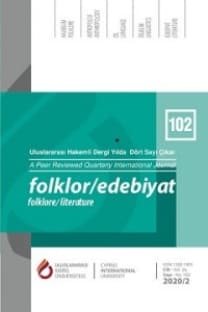BIR SIYASAL İLETIŞIM ARACI OLARAK FACEBOOK'UN SEÇMENLERIN OY VERME KARARI ÜZERINDEKI ETKILERI: KKTC 2013 MILLETVEKILLIĞI ERKEN GENEL SEÇIMLERI ÖRNEĞI
The Importance of Facebook As a Political Communication Tool to Influence Voting Decisions: The Case of TRNC 2013 Early Parliamentary Elections
___
- Aktaş, H. (2004). Bir Siyasal İletişim Aracı Olarak İnternet, Konya: Tablet Kitapevi. Aziz, A. (2007). Siyasal İletişim, İstanbul: Nobel Yayın Dağıtım.
- Bayraktutan, G., Binark, M., Çomu, T., Doğu, B., İslamoğlu, G., Aydemir, T., A., (2012). Sosyal Medyada 2011 Genel Seçimleri: Nicel Nitel Arayüzey İncelemesi. Selçuk İletişim, 7/3, 5-29.
- Blumler, J., G., Karanagh, D. (1999). The Third Age of Political Communication: Influences and Features. URL: http://www.cui.cz. (Şubat 10, 2012).
- Bond R., M., Fariss, C, J., Jones, J, J., Kramer, A., D., I., Marlow, C., Settle, J., E.; Fowler, J., H. (2012), A 61-Million-Person Experiment In Social Influence And Political Mobilization Nature, URL: http://www.nature.com/nature/journal/v489/n7415/ abs/nature11421.html, 295-298.
- Boyd, M., D., Ellison, B., N. (2008). Social Network Sites: Definition, History and Scholarship. Journal of Computer-Mediated Communication, 13, 210230.
- Chan-Olmsted, M., S., Cho, M., Lee, S. (2013). User Perceptions of Social Media: A Comparative Study of Perceived Characteristics and User Profiles by Social Media, 4, 149-178.
- Davis, A. (2010). Politics, Journalism and New Media: Virtual Iron Cages in the New Cultures of Capitalism. Fenton, N. (Ed.), New Media Old News, Journalism & Democracy in the Digital Age. SAGE Publications, 121-137.
- Graber, A., D., Smith, M., J. (2005). Political Communication Faces the 21st Century. Journal of Communication, 55, 479507. http://ysk.mahkemeler.net (Temmuz 10, 2013).
- Kaplan, M., A., Haenlein, M. (2010). Users of the World, Unite! The Challenges and Opportunities of Social Media, Business Horizons, 53, 59-68.
- Kietzmann, J.H., Hermkens, K., McCarthy, P.I., Silvestre, S.B. (2011). Social Media? Get Serious! Understanding the Functional Building Blocks of Social Media. Business Horizons, 54, 241- 251.
- Lazarsfeld, F., P. (1954). Voting: AStudy of Opinion Formation in a Presidential Campaign. Chicago: University of Chicago Press, 1954.
- Lister, M., Dovey, J., Giddings, S., Kelly, K. (2009). New Media A Critical Introduction. Britian: Taylor & Fancis Group.
- McGrath, M. (2011). Technology, Media and Political Participation. National Civic Review. 41-45.
- McNair, B. (2008). An Introduction to Political Communication. Londra: Routledge.
- McQuail, D., Windahl, S. (1998). Communication Models. England: Longman.
- Safko, L., Brake, D., K. (2009). The Social Media Bible: Tactics, Tools, and Strategies for Business Success. Hoboken, N.J.: John Wiley & Sons.
- Sarı, H. Siyasal İletişimde Yeni İletişim Teknolojilerinin Kullanımı: 2009 Yerel Seçimlerinde AK Partinin Çalışmaları, URL: http://www.hasansari.com.tr/upload/42603597.pdf. (Mart 10, 2012).
- Sipahi, B., Yurtkoru, E., S., Çinko, M. (2010). Sosyal Bilimlerde SPSS ile Veri Analizi. İstanbul: Beta Basım Yayın Dağıtım.
- Spierings, N., Jacobs K. (2014). Getting Personal? The Impact of Social Media on Preferential Voting, Political Behavior, 35/1, 215-234.
- Tuman, S., J. (2007). Political Communication in American Campaigns. SAGE Publications. Tumber, H. (2001). Democracy in the Information Age: The Role of the Fourth Estate in Cyberspace, Information, Communication & Society, 4/1, 95-112.
- Tuncer, A.S. (2013). Sosyal Medyanın Gelişimi. Özata, F., Z. (Ed.), Sosyal Medya. Eskişehir: Anadolu Üniversitesi Yayınları.
- ISSN: 1300-7491
- Yayın Aralığı: 4
- Başlangıç: 1994
- Yayıncı: -
Soyluluk Çiçeği Erguvan a Kültürel Bir İnceleme
Araştırma Sürecini Açmak: Bir Vaka ve Bir Sosyoloji Araştırması
Memoratlara Göre Karaca Ahmet Sultan
Hüseyin ÖZCAN, C. Sezen GÖNENÇ
ARAŞTIRMA SÜRECINI AÇMAK: BIR VAKA VE BIR SOSYOLOJI ARAŞTIRMASI
ALTAY TÜRKLERINDE YOLCULUK ILE İLGILI İNANIŞLAR VE RITÜELLER1
“Anayurt Oteli” ve “Dünya Ağrısı”nda Otel (S)İmgesi
